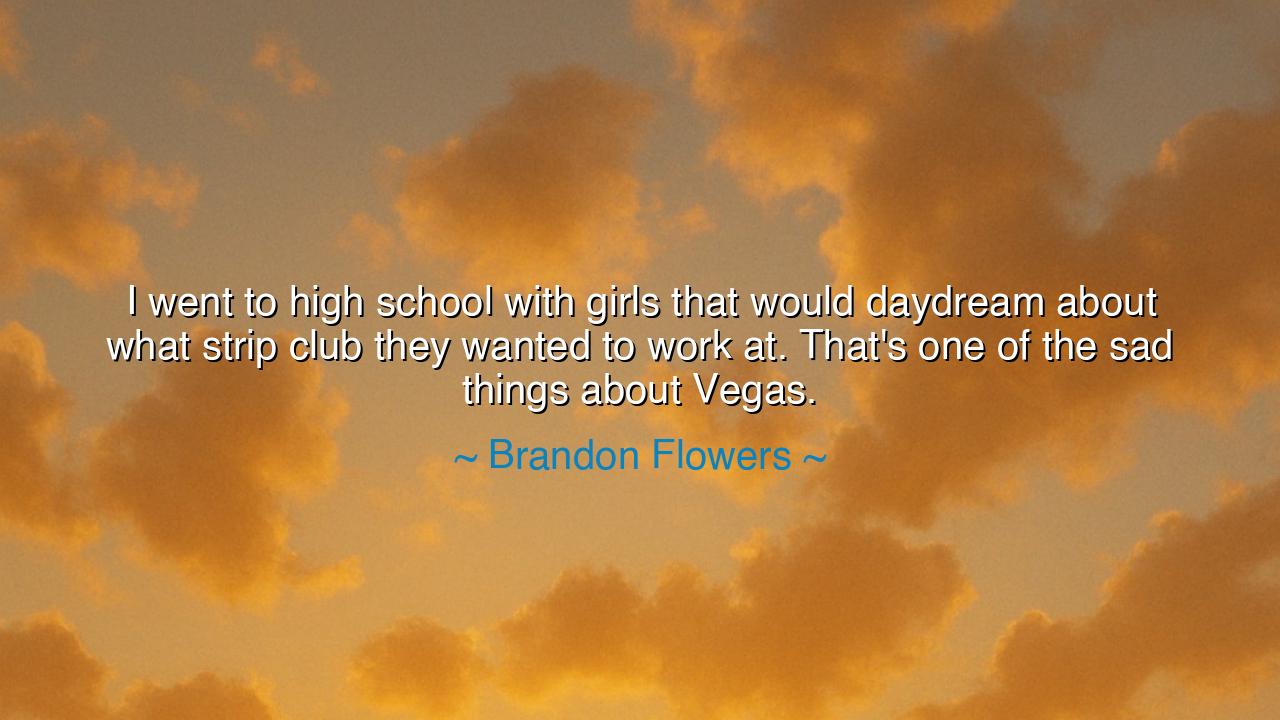
I went to high school with girls that would daydream about what
I went to high school with girls that would daydream about what strip club they wanted to work at. That's one of the sad things about Vegas.






Brandon Flowers once lamented the world of his youth with these words: “I went to high school with girls that would daydream about what strip club they wanted to work at. That’s one of the sad things about Vegas.” His reflection is not only personal memory but social commentary, a glimpse into the shadows of a city famed for its lights. Beneath the glitter of entertainment lies a culture where the dreams of some are shaped not by possibility, but by limitation, and where ambition is bent toward survival rather than flourishing.
The sadness here is not in the young women themselves, but in the narrowing of their vision. To daydream should be an act of hope, a flight of imagination into futures unbound. Yet in his recollection, the dreams of his peers were already hemmed in by the environment around them. The Vegas of tourists and wealth was not the Vegas of its children. For them, the visible paths were few, and the paths most accessible often led to exploitation disguised as glamour.
History echoes this pattern. In the slums of Victorian London, countless children grew up believing that their only destiny was the factory or the street. Though London was the heart of empire and wealth, for many it was a city of shadows. Charles Dickens, in his writings, gave voice to these children, showing how circumstance could crush potential and turn youthful dreams into mere survival. Brandon Flowers’s lament stands in the same tradition, reminding us that even in the brightest cities, there are dim corners where hope is constrained.
Yet his words are not without a note of resilience. For Flowers himself did not follow that path. Instead, he rose to find a voice through music, a voice that would echo far beyond Vegas. In telling this story, he reveals both the burden of environment and the possibility of transcending it. The sad thing is real, but it is not final. Even in the desert of limited dreams, there are springs of ambition that can nourish those who dare to seek another way.
The deeper meaning, then, is a call to recognize how environment shapes aspiration. The culture around us whispers what is possible, and often young minds accept those whispers as truth. To grow beyond them requires strength, guidance, and often the presence of mentors who can plant larger visions. Flowers’s memory warns us: we must not let our children inherit only the narrow dreams of circumstance, but instead must show them horizons beyond their immediate surroundings.
The lesson is both tender and fierce: cultivate dreams that lift, not diminish. If you are young, do not let your imagination be imprisoned by what is common around you. Seek examples of greatness, of beauty, of goodness, and set your course by them. If you are a parent, teacher, or guide, plant within those entrusted to you visions that are larger than the environment, so that when the world whispers limitation, they will remember that they were born for more.
Practically, this means nurturing creativity, education, and self-worth in ourselves and others. It means challenging the narratives that tell young people they must accept lesser destinies. It means celebrating not only the glamorous but the meaningful, not only survival but purpose. For the sad things of any city can be redeemed when we learn to dream beyond them, and when we pass those dreams forward.
Thus, Brandon Flowers’s words become more than memory. They are a mirror of society, showing both its failures and its possibilities. They remind us that even in the heart of Vegas, a place known for fleeting illusions, the truest work is to awaken lasting vision. And when we do, daydreams need not be sad—they can be seeds of greatness.






AAdministratorAdministrator
Welcome, honored guests. Please leave a comment, we will respond soon